Featured
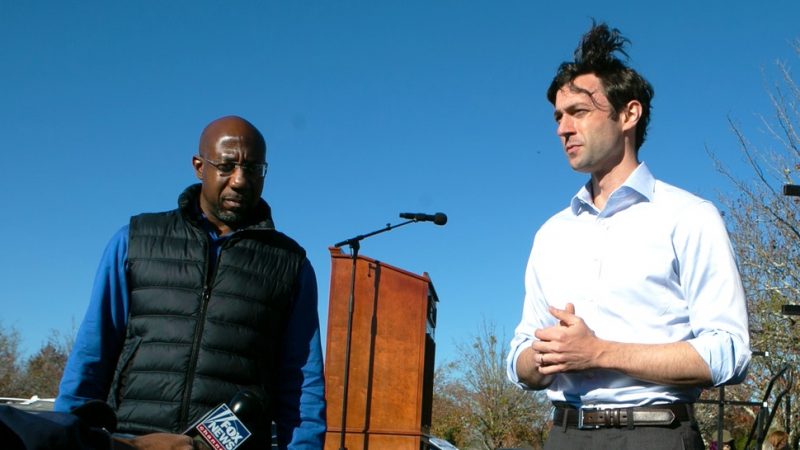 Can Jon Ossoff and Raphael Warnock Make History? By Timothy Pratt / The New Republic
Can Jon Ossoff and Raphael Warnock Make History? By Timothy Pratt / The New Republic
If you speak with people who have long known Reverend Raphael Warnock and Jon Ossoff—the Democratic candidates hoping to flip Georgia’s two U.S. Senate seats in tightly contested runoff elections on January 5—you will hear them use words like “destiny” and “providential” to describe the arc of their lives. In the end, the two candidates born and raised in Georgia will have to reach enough Black, brown, and what Otis Johnson called “well-meaning white folks” if they are to win. Read more
Related: Georgia Senate Runoff: Where the Race Stands One Week Out. By Ed Kilgore / NY Mag
Related: Trump Georgia rally could backfire, electing Ossoff and Warnock. By Brent Budowsky / The Hill
Political / Social
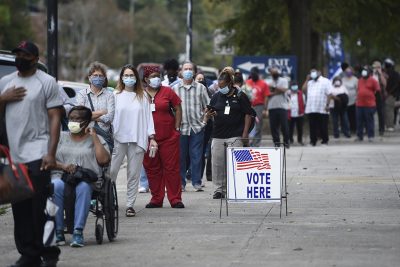 Strong early-vote turnout gives Dems hope in Georgia runoffs. By James Arkin / Politico
Strong early-vote turnout gives Dems hope in Georgia runoffs. By James Arkin / Politico
Democrats are buoyed by the strong early vote numbers, which show Black voters making up a larger percentage of the electorate than in November and higher early turnout in Democratic congressional districts in the state. Bothare positive signs for Jon Ossoff and Raphael Warnock, the two challengers, easing fears that the typical voter dropoff that has plagued Democrats in past years would doom the party’s chances with control of the Senate on the line. Read more
Related: Georgia Senate runoffs: Asian American voters could decide the results. By Li Zhou / Vox
Related: Atlanta Rappers Reignite Role as Political Kingmakers. By Mike Jordan / Rolling Stone
Related: Knocking on Two Million Doors in Georgia. By Audra D.S. Burch / NYT
 Voter suppression efforts ramp up ahead of Georgia runoffs: Poll closures hurt Black, Latino voters. By Igor Derysh / Salon
Voter suppression efforts ramp up ahead of Georgia runoffs: Poll closures hurt Black, Latino voters. By Igor Derysh / Salon
Voting rights groups are warning that early voting site closures in Georgia are limiting Black and Latino turnout in the state’s two highly-anticipated Senate runoff elections even as a federal judge on Monday ordered two counties to reverse a decision purging more than 4,000 voters from the rolls. Election officials in Hall County, which is located about an hour northeast of Atlanta and includes Gainesville, have opened four early voting sites, down from eight locations in the November election. The county is home to more than 200,000 people, nearly 40% of whom are Latino or Black. Multiple advocacy groups said that the closures were centered in areas with large Black and Latino populations, HuffPost reported. Read more
Related: Federal Judge Blocks Attempt to Purge Georgia Voter Rolls. By Joe Jurado / The Root
Related: Kelly Loeffler’s Sacrilegious Campaign. By John Nichols / The Nation
 What Was Trumpism? By Derek Thompson / The Atlantic
What Was Trumpism? By Derek Thompson / The Atlantic
As a white house resident, President Donald Trump is a goner. But his stranglehold on the GOP seems as tight as ever: Three in four Republicans say they believe their man won the 2020 election. Can the GOP channel the energy of his most fervent supporters and advance a sort of Trumpism without Trump? The answer depends on what Trumpism is—a populist prototype, a personality cult, or something stranger. Read more
Related: The Deep Origins of Latino Support for Trump. By Geraldo Cadava / The New Yorker
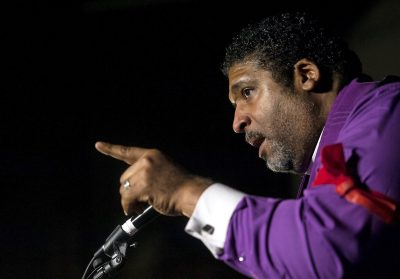 Rev. William Barber on Greed, Poverty and Evangelical Politics. By David Marchese / NYT
Rev. William Barber on Greed, Poverty and Evangelical Politics. By David Marchese / NYT
Very few religious leaders are able to inspire political action on the part of large numbers of people who don’t share their church, their denomination or their faith. Yet the Rev. Dr. William Barber, senior pastor of Greenleaf Christian Church in Goldsboro, N.C., has done just that. The initiatives he has helped to start — the Moral Mondays series of protests and the Martin Luther King Jr.-inspired Poor People’s Campaign — have motivated legions across the country to engage in demonstrations and peaceful civil disobedience in support of racial, economic and environmental justice as well as the protection of voting rights, among other issues as much moral as political. Read more
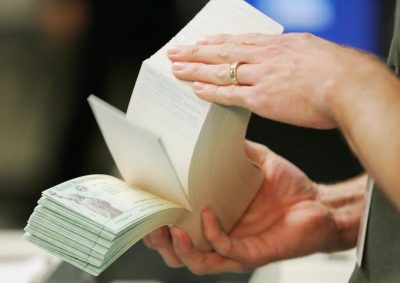 $2,000 vs. $600 stimulus payments isn’t the real issue. By Catherine Rampell / Wash Post
$2,000 vs. $600 stimulus payments isn’t the real issue. By Catherine Rampell / Wash Post
There are plenty of reasons to be unhappy with the covid-19 stimulus compromise President Trump signed on Sunday. Its shortcomings, however, are not the specific provisions that populists on both the left and right are complaining about. The biggest problem with the U.S. fiscal response so far is not the overall amount of aid nor the generosity of our nearly universal stimulus checks; it’s how inefficiently many of those dollars have been allocated. And expanding direct stimulus payments, as the House voted to do Monday, would only make this problem worse. Read more
Related: Why increasing the stimulus checks from $600 to $2,000 is a bad idea. By the Editorial Board / Wash Post
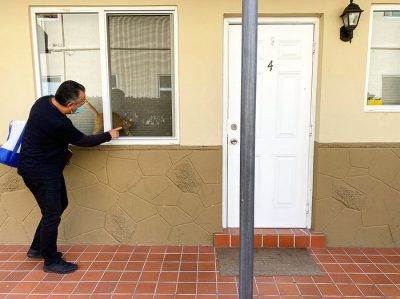 In Miami’s Diverse Communities, Coronavirus Communication Takes Time. By Veronica Zaragovia / NPR
In Miami’s Diverse Communities, Coronavirus Communication Takes Time. By Veronica Zaragovia / NPR
Little Havana is a neighborhood in Miami that, until the pandemic, was known for its active street life along Calle Ocho, including live music venues. There you can find examples of the quintessential ventanita serving Cuban coffee and a historic park where men gather to play dominoes. But during the pandemic, a local group called Healthy Little Havana is zeroing in on this area with a very specific assignment: convincing residents to get a coronavirus test. Read more
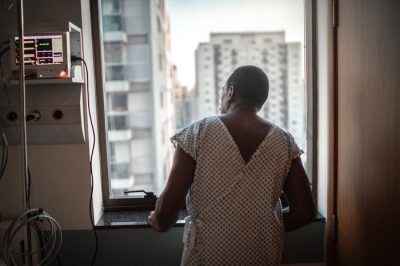 A Debate Is Underway About The Use Of Race In Kidney Care. By Maria Godoy / NPR
A Debate Is Underway About The Use Of Race In Kidney Care. By Maria Godoy / NPR
As the U.S. grapples with the effects of systemic racism, some in the medical community are questioning whether the tools they use to assess patient health may be contributing to racial health disparities. That debate is playing out most prominently in the world of kidney medicine. Black people are almost four times more likely to suffer from kidney failure than non-Hispanic whites. And once they get to that stage, Black patients spend months longer waiting for a kidney transplant than white patients. Read more
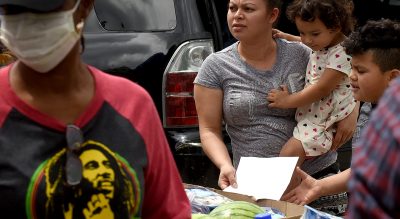 Black, Latina women lose jobs as COVID-19 crisis limits child care. By Claire Thornton / USA Today
Black, Latina women lose jobs as COVID-19 crisis limits child care. By Claire Thornton / USA Today
The COVID-19 recession has affected groups in different ways. Black moms have been more likely than Latina moms and white moms to quit their jobs. Higher rates of layoffs affected immigrant moms most severely in 2020. Meanwhile, Latina moms were more likely to be laid off than white and Black moms. This is in part because Latinas were more likely to work face-to-face service positions, such as in restaurants and hotels. Read more
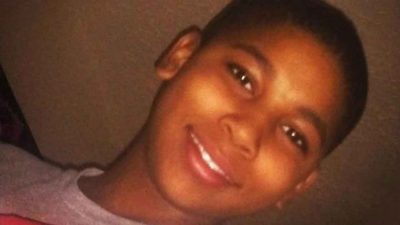 Justice Department Declines Charges Against Officers In Tamir Rice Case. By Michael Baisamo and Eric Tucker / HuffPost
Justice Department Declines Charges Against Officers In Tamir Rice Case. By Michael Baisamo and Eric Tucker / HuffPost
The Justice Department announced Tuesday that it would not bring federal criminal charges against two Cleveland police officers in the 2014 killing of 12-year-old Tamir Rice, saying video of the shooting was of too poor a quality for prosecutors to conclusively establish what had happened. In closing the case, the department brought to an end a long-running investigation into a high-profile shooting that helped galvanize the Black Lives Matter movement and that became part of the national dialogue about police use of force against minorities, including children. Read more
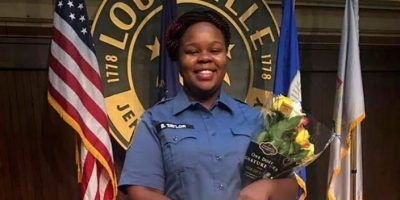 Louisville Police To Fire 2 More Officers Involved In Death Of Breonna Taylor. By Elena Moore / NPR
Louisville Police To Fire 2 More Officers Involved In Death Of Breonna Taylor. By Elena Moore / NPR
Two police officers who were part of the raid that ended with the shooting and death of Breonna Taylor, a 26-year-old Black woman, are reportedly being terminated by the Louisville Metro Police Department. The move comes nine months after Taylor was killed in her apartment when police attempted to carry out a search. Read more
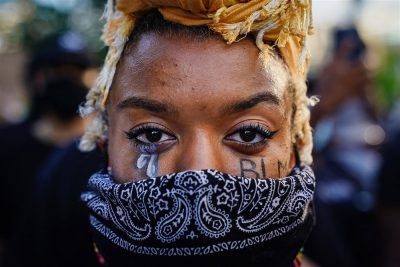 A movement, a slogan, a rallying cry: How Black Lives Matter changed America’s view on race. By Char Adams / NBC News
A movement, a slogan, a rallying cry: How Black Lives Matter changed America’s view on race. By Char Adams / NBC News
In 2013, Alicia Garza offered words of comfort in a Facebook post to Black people after George Zimmerman was acquitted of murder in the killing of 17-year-old Trayvon Martin: “Our lives matter.” From the phrase, Garza and her friends Patrisse Cullors and Opal Tometi created #BlackLivesMatter. What started as a poignant hashtag has come to define a generation. In seven years, Black Lives Matter has become a multichapter organization that has changed the very framework with which the nation talks about race. Read more
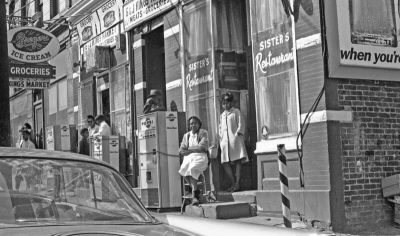 These Cities Tried to Tackle Disinvestment. Here Are Lessons From What Happened. By Haru Coryne and Tony Briscoe / ProPublica
These Cities Tried to Tackle Disinvestment. Here Are Lessons From What Happened. By Haru Coryne and Tony Briscoe / ProPublica
Local governments have made efforts to revive commerce in neglected Black neighborhoods around the country. It hasn’t always worked. But Chicago can learn from their experiences. They poured millions into deals with giant corporations. They propped up small businesses. They changed the tax code. They expanded mass transit. In cities as distinctly different as Washington; Newark, New Jersey; Chicago and Pittsburgh, government officials have found ways to restore essential goods and services to neighborhoods devastated by population loss and the flight of business. Read more
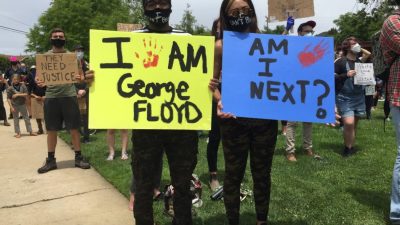 How Past Economic Policies Influenced Racism of Today. By Sarah Lahm / The Progressive
How Past Economic Policies Influenced Racism of Today. By Sarah Lahm / The Progressive
George Floyd was born in 1973 and came of age in the 1980s. Ronald Reagan’s presidency shaped the backdrop of his formative years, when austerity measures and trickle-down economics were bumping up against the gross excesses of Wall Street and the glorification of the yuppie lifestyle. A 2019 piece in The Washington Post, from historian Bruce J. Shulman, describes a through line from the yuppism of the 1980s, where conspicuous consumption reigned, to Trump’s presidency. In hindsight, Shulman writes, “the brief heyday of the yuppie actually represented the birth of Trumpism: hedonism, financial recklessness and contempt for tradition.” Read more
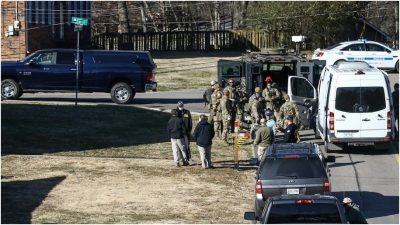 Usual white privilege and presidential silence applied when Nashville bomber identified as white man. By Lauren Floyd / Daily Kos
Usual white privilege and presidential silence applied when Nashville bomber identified as white man. By Lauren Floyd / Daily Kos
In the hours after the FBI identified a 63-year-old white man as the sole suspect in the deadly Christmas bombing in Nashville, Tennessee, activists and social media users alike couldn’t help but notice the media narratives that had formed around him. The Tennessean reported that Anthony Quinn Warner, a computer technician initially named a “person of interest” in the bombing, died in the explosion authorities later said he caused. It’s the kind of description people of color are seldom afforded. President Donald Trump chose to remain silent on the bombing altogether. Read more
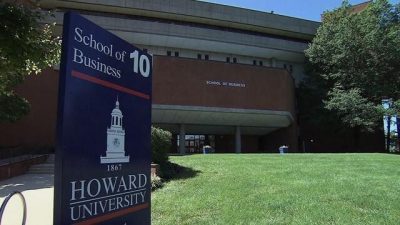 HBCUs still facing funding challenges despite surge in enrollments. By WTOP and CBS News
HBCUs still facing funding challenges despite surge in enrollments. By WTOP and CBS News
Despite the important role HBCUs have played in America’s education system, Newkirk said many of the colleges and universities are facing funding challenges. “There were once about 400 historically Black institutions or HBCUs. There are about 100 left and they were the ones that survived and made it through all the tough times,” he said. About one-third of HBCUs have experienced record increases in applications and enrollment over the past three years, according to the Rutgers Center For Minority Serving Institutions. Read more
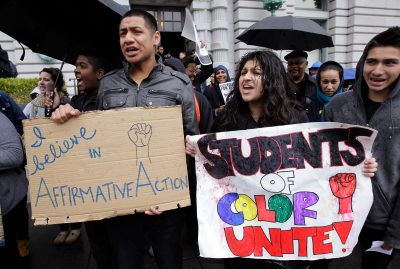 Affirmative action divides California, US; Supreme Court case looms. By Elinor Aspergen / USA Today
Affirmative action divides California, US; Supreme Court case looms. By Elinor Aspergen / USA Today
When Proposition 16 did not pass in California in November, leaving a ban on affirmative action in place,Naomi Waters was dismayed but not surprised. “So this is where we’re at?” the third-year student at the University of California-Riverside recalled thinking of California’s political leanings. “It’s disheartening where we are currently, but then looking nationally, it isn’t really that much of the surprise,” said Waters, the Racial Justice Now chair of the University of California Student Association. Proposition 16 would have removed the ban in the California Constitution on considering race and sex in government hiring and education. In other words, it would have reinstated a practice called affirmative action, most notably at the state’s public colleges. Read more
Historical / Cultural
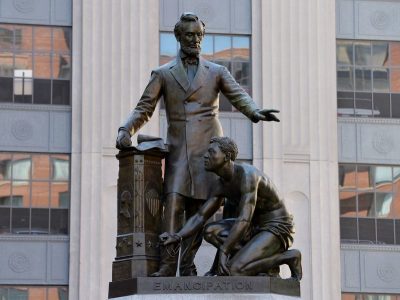 Statue Of Lincoln With Formerly Enslaved Man At His Feet Is Removed In Boston. Bill Chappell / NPR
Statue Of Lincoln With Formerly Enslaved Man At His Feet Is Removed In Boston. Bill Chappell / NPR
Workers dismantled a statue of Abraham Lincoln in Boston Tuesday, after the city agreed with protesters who say the memorial is demeaning and lacks proper context. The statue depicts Lincoln holding his hand over a kneeling Black man — a figure modeled on Archer Alexander, the last man captured under the Fugitive Slave Act. Read more
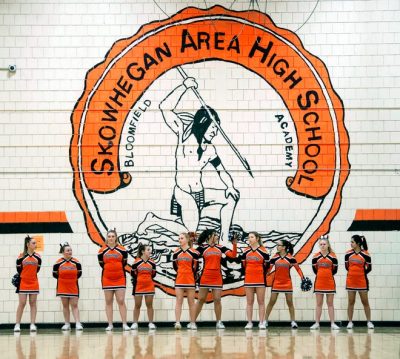 Native American mascots: Maine set the standard with ban on mascots. By Lorenzo Reyes / USA Today
Native American mascots: Maine set the standard with ban on mascots. By Lorenzo Reyes / USA Today
To this day, the problem of Native American themed mascots at schools across the country persists. The National Congress of American Indians (NCAI) keeps a database that tracks them and, according to the list that was last updated Dec. 9, there are still 1,916 schools in 1,025 school districts that use such mascots. The database lists five mascots as the most common: “Indians” (799), “Warriors” (417), “Braves” (208), “Chiefs” (181) and “Redskins” (95). In Maine, this problem has all but vanished. Skowhegan Area High School was the last public school to use a Native American mascot before its board voted in March 2019 to retire the “Indians” mascot. Two months later, a law was enacted that effectively banned the use of such mascots in public schools and colleges. Read more
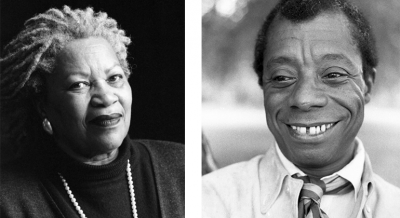 Make Toni Morrison, James Baldwin required reading for the next generation. By Kris Rhim / The Undefeated
Make Toni Morrison, James Baldwin required reading for the next generation. By Kris Rhim / The Undefeated
Like many college students, I dread studying Shakespeare. As a young Black man learning what it means to be Black in America, it has been incredibly frustrating that I have been required to study white authors such as Shakespeare with racist texts, but have had to go out of my way to read authors such as James Baldwin and Toni Morrison that write extensively about white supremacy and racism. Read more
 In 2020, Latinos had bright TV moments despite persistent lack of representation. By Nicole Acevedo / NBC News
In 2020, Latinos had bright TV moments despite persistent lack of representation. By Nicole Acevedo / NBC News
The creators of “Selena: The Series,” (shown) the documentary filmmakers behind “Mucho Mucho Amor: The Legend of Walter Mercado” and the producers of “Diary of a Future President” are among the many Latino creators who produced meaningful moments of Latino visibility on TV this year despite a chronic lack of Latino representation. Overall representation for Latinos on television was 5.5 percent throughout 2019, even though Latinos represent nearly 19 percent of the nation’s population. “That isn’t great,” de Armas said. “Latinos were significantly underrepresented on every platform, every genre, and in total.” Read more
Sports
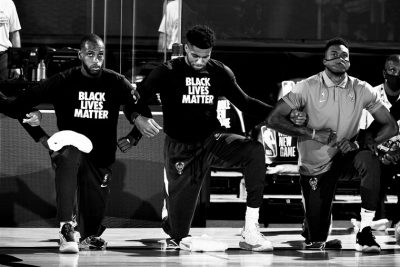 ‘Up the ante’: What players, NBA are doing for racial justice. By Randi Richardson / NBC News
‘Up the ante’: What players, NBA are doing for racial justice. By Randi Richardson / NBC News
“Our first step was voting, getting people out to register, getting people out to the polls,” Washington Wizards guard Bradley Beal said, according to The Athletic. “We accomplished that. Now it’s on to the next issue in society, addressing the systemic racism we still have, addressing the police brutality, addressing all these things we still deal with on a daily basis. The financial curve, that needs to be, that gap needs to be shrunk. There’s a lot of things we need to dive into as a society, and I think us as a PA, as a league, we’re going to continue to push those narratives.” Beal said “we don’t really care” if television ratings drop because players organized. Read more
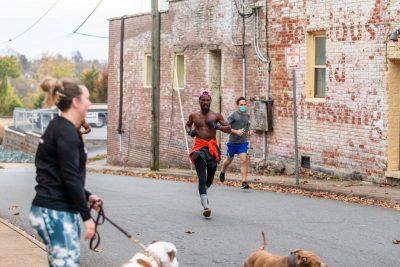 With Each Run, a City Shaken by Racism Is ‘Finding the Greater Good.’ By Anna Katherine Clemmons / NYT
With Each Run, a City Shaken by Racism Is ‘Finding the Greater Good.’ By Anna Katherine Clemmons / NYT
In 2006, William Jones III moved with his wife, Yolonda, to Charlottesville, Va. Two years before, Jones, who is Black, had started jogging regularly. But when he looked around Charlottesville, he saw only white people running. “I said, ‘I got to see myself out here,’” Jones, 38, said. “We got to run in our neighborhoods. If I’m not seeing Black people running, then the people who really need to see Black people running are not seeing them either.” So, he designed an almost five-mile route running through the city’s predominantly Black neighborhoods, beginning and ending at the Jefferson School, a community center that in 1926 had opened as the first high school in Charlottesville for African-Americans. The route William Jones III designed 15 years ago through predominantly Black neighborhoods in Charlottesville, Va., has become the impetus for a diverse running group that’s grown since the summer. Read more
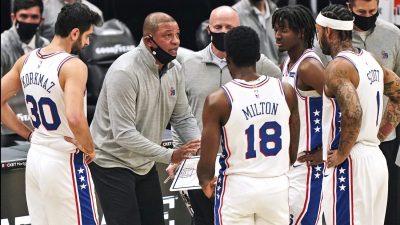 Doc Rivers and the mixed emotions of moving up the NBA’s wins list. By Marc J. Spears / The Undefeated
Doc Rivers and the mixed emotions of moving up the NBA’s wins list. By Marc J. Spears / The Undefeated
Doc Rivers joined an elite coaching fraternity on Saturday by moving into 10th place on the all-time NBA wins list. But the Philadelphia 76ers’ head coach is also a member of a much smaller coaching fraternity that won’t be adding any new members anytime soon. Of the NBA’s top 25 winningest coaches, only three are African American: Rivers, Lenny Wilkens and Nate McMillan. Read more
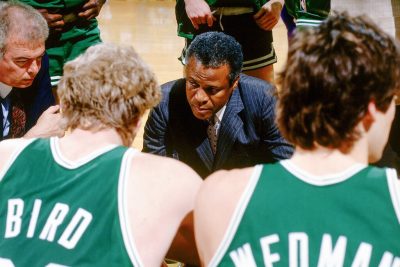 K.C. Jones Never Got His Due in Boston. Race Played a Part. By Harvey Araton / NYT
K.C. Jones Never Got His Due in Boston. Race Played a Part. By Harvey Araton / NYT
With Bill Russell, he won two N.C.A.A. titles at the University of San Francisco and an Olympic gold medal. With Russell in Boston, as a point guard specializing in defense, he won eight N.B.A. titles. As an assistant coach to his former Celtics teammate Bill Sharman in Los Angeles, he sprinkled championship dust on the Lakers in 1971-72. He won another ring in 1980-81 as Bill Fitch’s assistant in Boston and two more as the head coach during the prime years of the Bird era. Sad to say, to the day he died at 88, on Christmas last week, Jones never got the credit he deserved. Read more
 LeBron James wins AP Male Athlete of Year award. By The Associated Press
LeBron James wins AP Male Athlete of Year award. By The Associated Press
LeBron James told the world in 2020 that Black Lives Matter. He helped convince many who had never voted to finally head to the polls. He found more ways to continue elevating the lives of people in his hometown. If that weren’t enough, he won another NBA championship. “I still know what I do on the floor and obviously, I give everything to the game,” James told AP. “But I can make a greater impact off the floor right now, more than I can on the floor. And I want to continue to inspire people with the way I play the game of basketball. But there’s so many more things that I can do off the floor to help cultivate people, inspire people, bring people together, empower them.” Read more
Site Information
Visit our home page for more articles, book/podcast and video favorites. And at the top of this page register your email to receive notification of new editions of Race Inquiry Digest. Click here for earlier Digests.
About Race Inquiry and Race Inquiry Digest. The Digest is published on Mondays and Thursdays.
Use the buttons below to share the Digest in an email, or post to your Facebook, Linkedin or Twitter accounts.